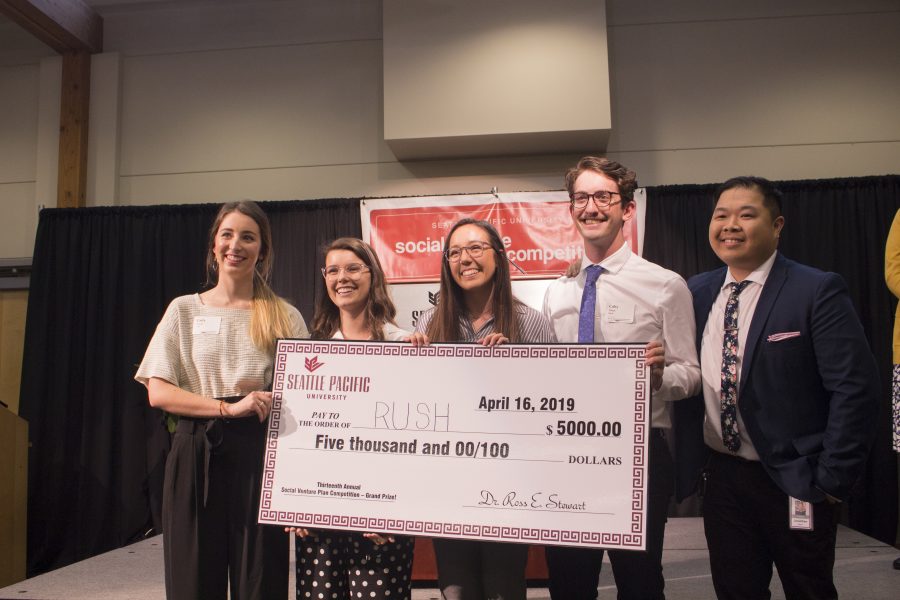Featured image: RUSH is the winner of the %5000 at the Social Venture. Jacky Chen | The Falcon
Written by: Jenn S. Tran, Layout Editor, and Blake Dahlin, Staff Reporter
People from around the community, from Seattle Pacific University to local leaders, gathered in Upper Gwinn on Tuesday afternoon for the annual Social Venture Plan Competition.
The room buzzed with noise and life, as students pitched their projects to a room filled with judges and spectators. The community was invited to vote for the project of their choosing to win a separate prize. At the end of the night, the grand-prize winner of the competition took home $5,000 in prize money, as startup funds to launch their initiative.
The Social Venture Plan Competition has been a highlight of the Spring Quarter at SPU for 13 years. Students from various different schools, ranging from Global Development to Nutrition, join forces to create entrepreneurial projects that are both sustainable and beneficial to society.
Their projects begin as idea in the fall, and as the months go on, they develop and form into projects that have real and tangible potential to create positive and sustainable social change.
But there is a quality to the projects at the Social Venture Plan Competition that distinguishes them from most societal benefit plans.
As Mark Oppenlander, the event coordinator, puts it, the Social Venture Plan Competition “is an attempt to get students to think about entrepreneurship and business more generally as a way to create social change.” .
One initiative being pitched was called Teplo, a project to provide shelter to displaced peoples around the world.
Madisynn McCombs, a member of the Teplo team, describes their project as a “semi-permanent, insulated modular shelter unit, designed for people who are displaced in cold weather climates.”
The unit’s insulation, combined with a modular and therefore easily deployable structure, position it as a creative and unique solution to temporary housing in cold weather climates.
“There are millions of refugees around the world and they are sleeping in tents, but in places like Ukraine, where there is 1.5 million displaced people, when it is 14 degrees outside during the winter … a tent is not sufficient housing,” said McCombs, when asked about the purpose of the Teplo project. Another project on display was called Rush, a small unit designed to provide clean drinking water to those in disaster hit areas.
Coby Olson, an engineering student at SPU, spoke of the vision behind the project. He expressed the Rush team’s belief that “access to human water is a fundamental human right.” But thousands of people around the world, especially disaster victims, have their access to clean water cut off.
Rush’s water condensing unit is designed to be portable, so that it can be distributed rapidly in the event of a natural disaster.
Olson spoke of the long term plans for the project, stating that Rush plans to “work with relief organizations and NGOs to get clean water to disasters as fast as possible.”
Members of the community come to the showcase for a variety of reasons. Michael, who works with Urban Impact in the Rainier Valley, came to support students who were sponsored by Urban Impact.
For Michael, “economic development forms neighborhoods, and so when people have jobs in the areas where they live, they can stay there without commuting for hour of being displaced.”
Tammy Miller, a member of a foundation that sponsored the event, and a coach for the Evity project, spoke of her experience coming to the Social Venture Plan Competition.
“I’ve been coming here for six years, and I think it’s better every year. The presentations are better, the students are extremely impressive, and the ideas keep getting better and better.”
At the end of the competition, only one project took home the start-up money. But winning is not everything in this competition.
Mark Oppenlander believes that this is about more than just starting businesses or solving problems.
“A lot of students don’t think about starting their own business or their own organization as a possible path for themselves, and we are encouraging them through this process of doing it on paper and pitching it to think about this as something that they might want to do with their lives.”
The competition concluded with an awards ceremony honoring the following entrepreneurial projects: Evity, Syzzle, BOLDLY B.E.E, Verity, Teplo and Rush.
Evity won the community’s choice award, while Syzzle was awarded the Rainier Valley Track prize. BOLDLY B.E.E, Evity, and Verity all tied for the honorable mention category. Teplo was the runner up for the Herbert B. Jones grand prize, with Rush taking home first place.

















































































